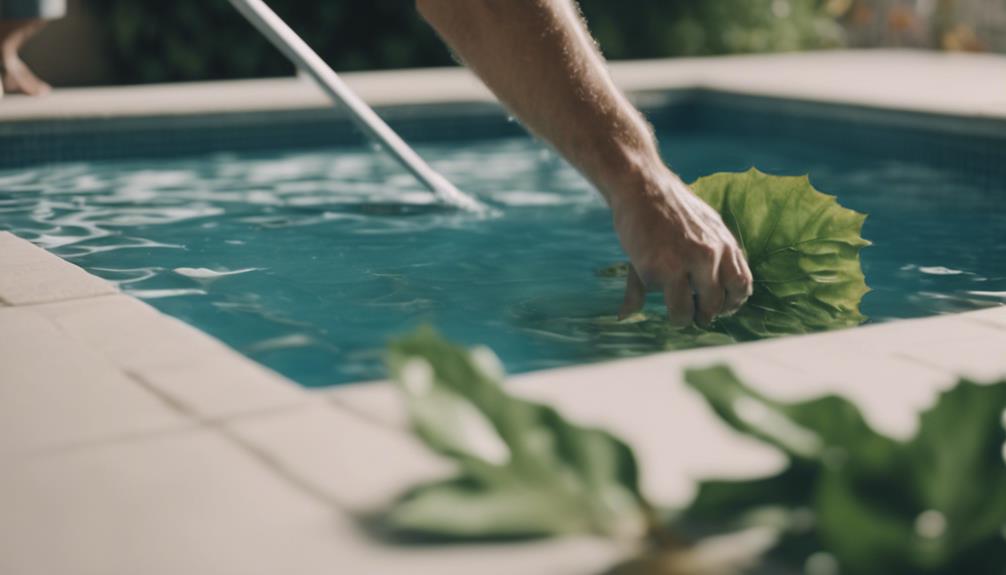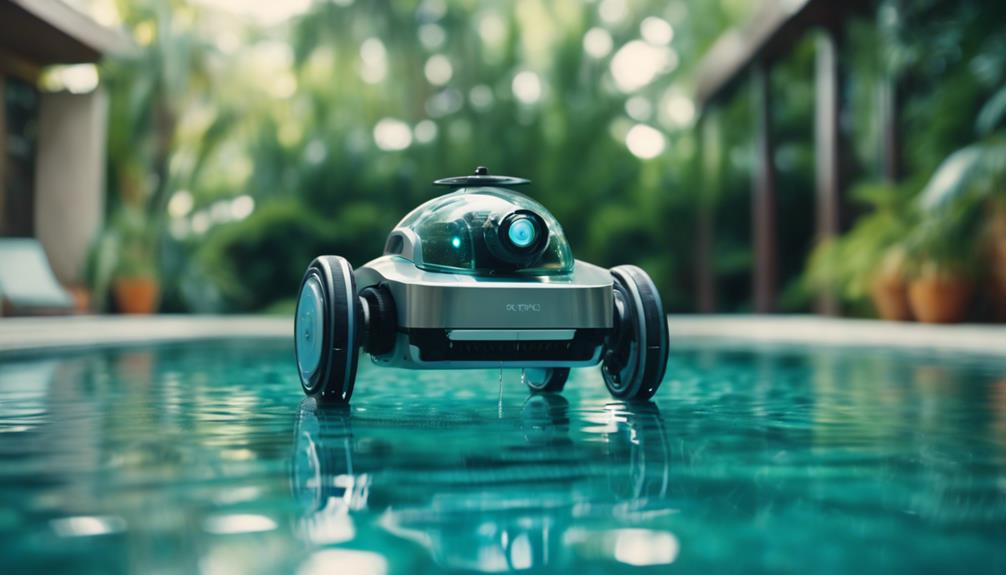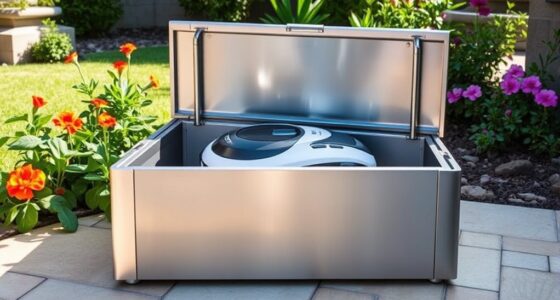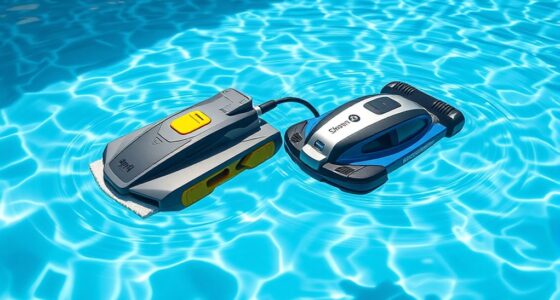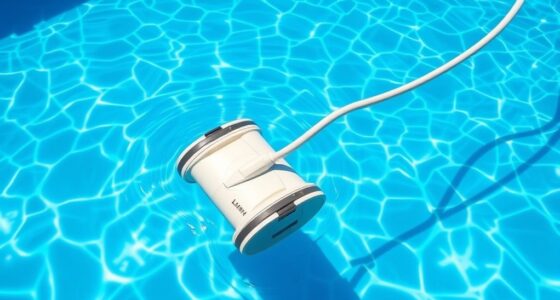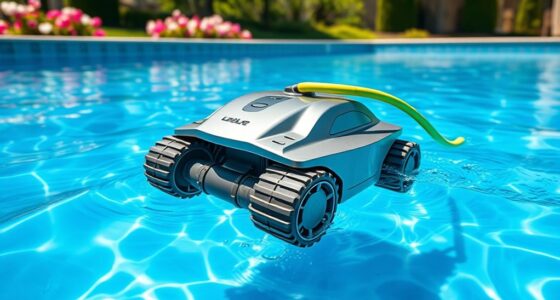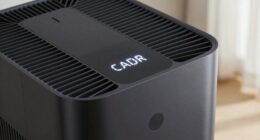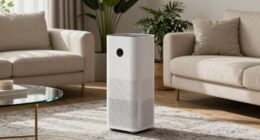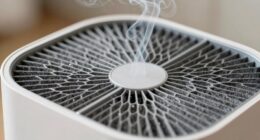Achieve clear water in your pool by simply following these steps: First, gather all necessary supplies, such as a pool brush and chemicals. After that, remove the cover and any debris from the pool. Proceed to carefully reconnect the pool equipment. Make sure to add water up to the proper level, prime the pump, and start the filtration system. Regularly test the water and adjust the chemicals as needed to maintain the balance. By consistently monitoring the water quality, you can ensure a clean and safe swimming experience for yourself. Following these steps will allow you to enjoy a sparkling pool all year long.
Key Takeaways
- Use pool cleaning supplies like a brush, vacuum, and chemicals.
- Properly reconnect all pool equipment after cleaning.
- Maintain the water level at the skimmer opening.
- Prime the pump and start the filtration system promptly.
- Test and balance pool water chemistry regularly for clarity.
Gather Necessary Supplies
To efficiently clean a pool, start by gathering essential supplies such as a pool cover pump, broom or skimmer net, pool brush, pool vacuum, garden hose, pool chemicals, and a water testing kit to maintain proper chemical balance. These tools are important for keeping your pool water clean and safe for swimming.
The pool brush helps scrub off any dirt or algae clinging to the pool walls, while the pool vacuum is necessary for removing debris from the pool floor. Make sure you have a water testing kit to check the pH level and chemical balance of the water. Maintaining the correct pH level is essential for the effectiveness of pool chemicals and the comfort of swimmers.
Additionally, having the right pool chemicals like chlorine, pH increaser/decreaser, alkalinity increaser, and shock treatment on hand will help you keep your pool water clear and sanitized. By gathering these supplies, you're setting yourself up for a successful pool cleaning routine.
Remove Pool Cover and Debris
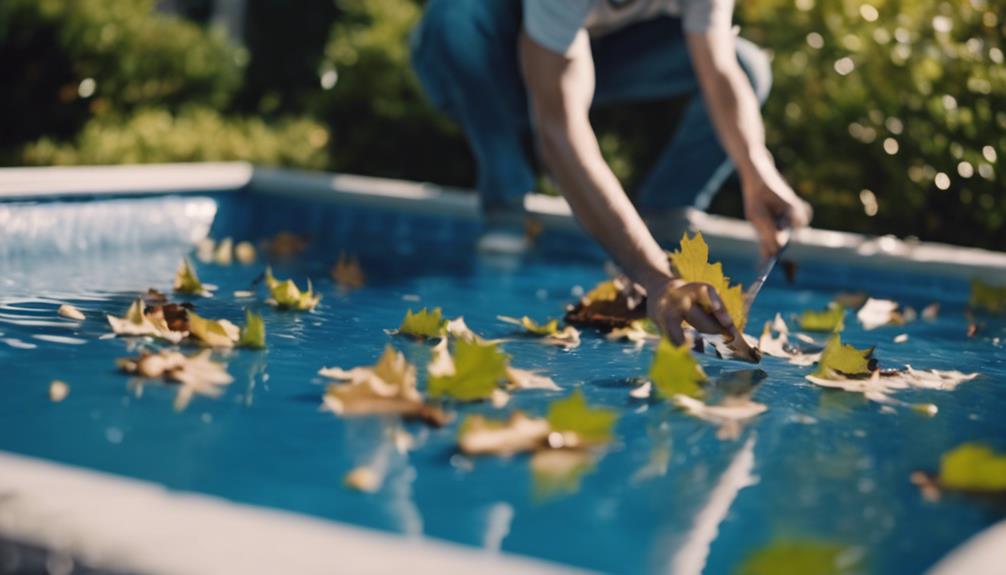
To start cleaning your pool, begin by removing the pool cover and debris that has accumulated on top. Use a pool cover pump to eliminate any excess water, then gently sweep away leaves and use a skimmer net to clear out debris.
This step will help guarantee that when you uncover your pool, it's free of dirt and ready for the next stage of cleaning.
Clear Pool Cover
Remove any water and debris from your pool cover using a pool cover pump before beginning the cleaning process. Clearing the cover guarantees that no dirt or leaves fall into the pool when you remove it. Use a soft broom or a skimmer net to gently sweep off any remaining debris from the surface of the pool cover. Be cautious not to push the debris into the water below. Once the cover is free of debris, carefully take it off the pool, making sure not to shake it vigorously and scatter debris back into the pool water.
To help you visualize the process better, here is a table summarizing the steps to clear your pool cover effectively:
| Steps to Clear Pool Cover | Tools Needed |
|---|---|
| Use pool cover pump to remove water | Pool cover pump |
| Sweep off debris with soft broom or skimmer net | Soft broom, Skimmer net |
| Carefully remove pool cover | N/A |
| Store cover properly for future use | Mild detergent, Dry storage area |
Sweep Away Leaves
Before you can proceed to clear the pool cover of leaves and debris, make sure that excess water has been removed using a pool cover pump. This step is important to prevent any debris or dirty water from falling into the swimming pool water when you remove the cover.
Once the water is pumped out, gently sweep away any leaves or debris on the cover using a soft broom or a skimmer net. Be mindful not to let the debris fall back into the pool water.
Carefully remove the pool cover once it's free of debris. Avoid shaking the cover vigorously as this can release accumulated dirt into the pool, leading to cloudy pool water.
After the cover is off, clean it with a mild detergent, making sure it's thoroughly dry before storing it properly for future use.
Remember to reconnect all pool equipment correctly, including the pump, filter, and heater, before starting the filtration system. This will help maintain clean and clear pool water for your enjoyment.
Skim Out Debris
Use a pool cover pump to eliminate water and debris from the pool cover effortlessly.
Before removing the cover, clear off leaves and debris using a soft broom or skimmer net. This step helps prevent any debris from falling into the pool when you take off the cover.
Carefully lift and remove the pool cover, ensuring that no dirt or leaves slide into the water.
Once the cover is off, clean it with a mild detergent, let it dry completely, and store it properly for future use.
It's essential to make sure all pool equipment, such as the pump and filter, are reconnected before starting the filtration system.
Reconnect Pool Equipment
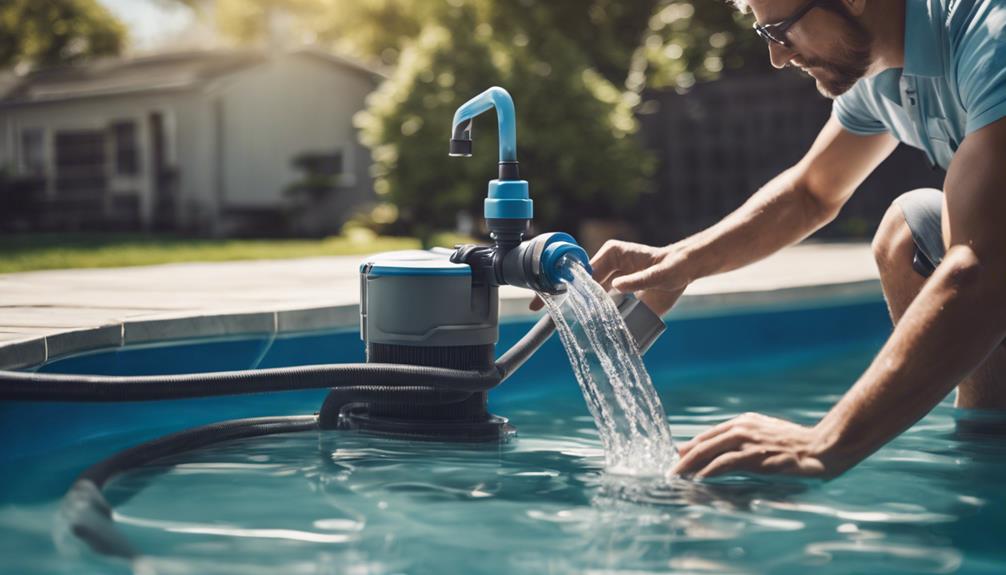
Reconnecting your pool equipment, including the pump, filter, heater, and accessories, is vital for proper functioning and maintenance. Before starting, make sure all drain plugs are securely reinstalled to prevent leaks.
Check all connections for tightness and signs of damage. Properly prime the pump by filling it with water to ensure the efficient operation of the filtration system.
Starting the filtration system promptly after reconnecting the equipment is essential for maintaining clean and clear pool water. Neglecting to reconnect any part of the pool equipment can lead to inefficiencies and potential damage.
Take the time to double-check each component to avoid any issues down the line. By following these steps and properly reconnecting your pool equipment, you set the stage for a smoothly running filtration system that keeps your pool water pristine.
Add Water to Proper Level
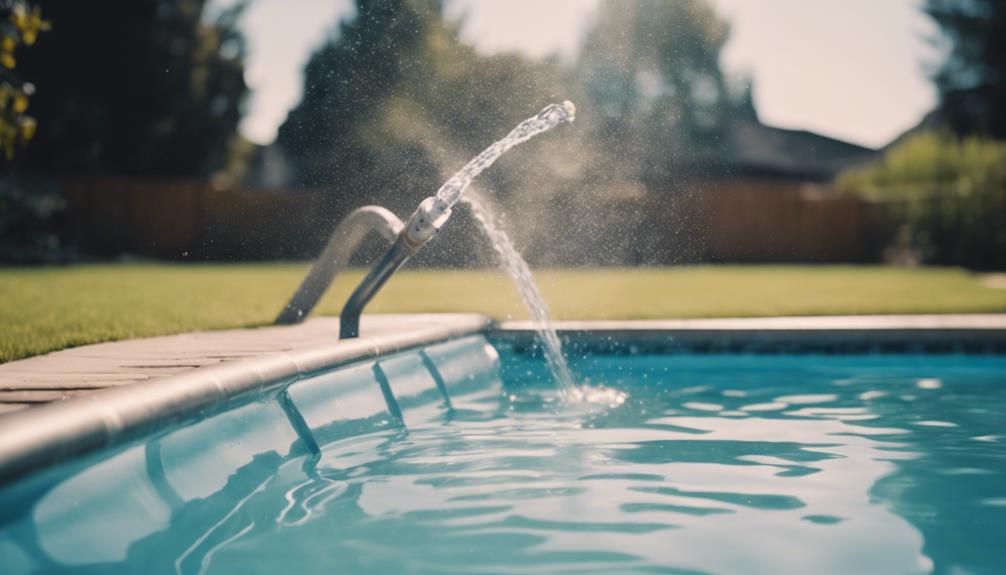
To properly maintain your pool, it's important to monitor and adjust the water level regularly. Keep the water filled to the middle of the skimmer opening for efficient filtration.
Maintaining the correct water level prevents pump damage and guarantees proper water circulation.
Water Level Maintenance
Maintaining the water level in your pool at the middle of the skimmer opening is essential for efficient filtration and equipment protection. Adding water to the proper level aids the skimmer in effectively removing debris. An insufficient water level can lead to the pump running dry, potentially causing equipment damage. Factors like evaporation and splashing contribute to water loss, necessitating regular monitoring and refilling to maintain the ideal level. Consistency in water level is key to ensuring ideal pool circulation and filtration.
| Importance of Water Level Maintenance |
|---|
| Ensures efficient filtration |
| Protects equipment from damage |
| Aids in removing debris effectively |
| Maintains ideal pool circulation |
Monitoring Water Depth
Regularly monitor and adjust the water depth in your pool to ensure maximum filtration and circulation efficiency. Maintaining the pool water level at the proper height is essential for top-notch filtration and circulation. Ideally, the water level should be kept around halfway up the opening of the pool skimmer. By ensuring the water is at the correct depth, you help prevent pump damage and enable efficient skimming of debris.
Check and adjust the water level frequently, especially during hot weather or times of high evaporation. Keeping the water at the right depth is vital for the overall health and clarity of your pool water. Neglecting the water depth can lead to poor filtration, circulation issues, and potential damage to your pool equipment. So, remember to monitor and adjust the water level regularly to enjoy a clean and well-maintained pool.
Filling Pool Correctly
Adjusting the water level in your pool is essential for proper water circulation and filtration efficiency. To guarantee peak performance, maintain the water level at the midpoint of the skimmer opening. This level allows the skimmer to efficiently remove debris, keeping your pool clean.
Adequate water level also plays a critical role in ensuring proper filtration and even chemical distribution throughout the pool.
Maintaining the correct water level not only promotes efficient circulation but also prevents strain on the pump and filtration system. Incorrect water levels can lead to cloudy water and hinder the overall cleanliness of your pool.
As such, it's important to regularly monitor and adjust the water level to keep your pool water crystal clear.
Prime Pump and Start Filtration
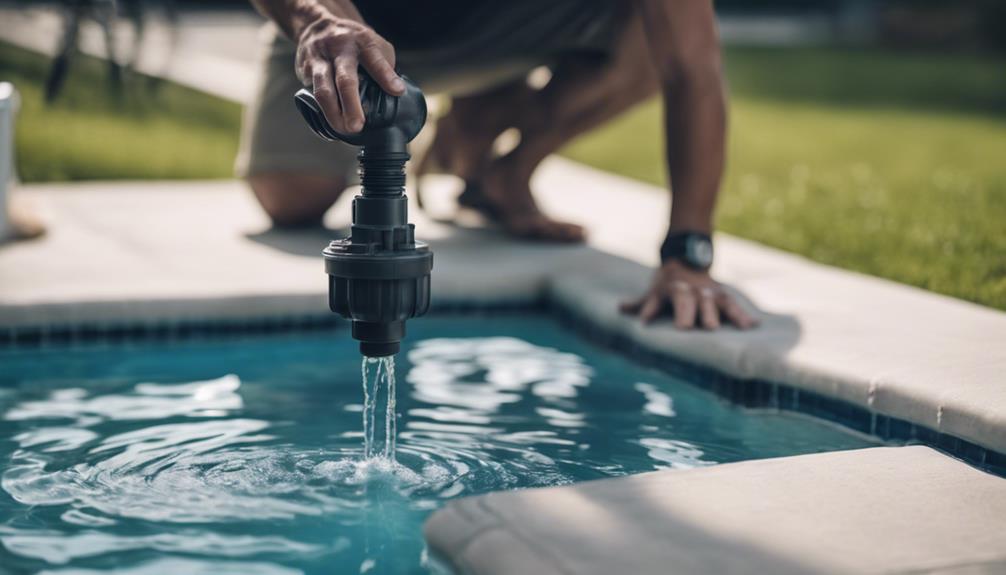
Priming the pump and starting the filtration system are essential steps in guaranteeing proper operation and efficient cleaning of your pool.
Here's what you need to do:
- Priming the Pump: Fill the pump with water before starting to create the necessary suction for effective filtration.
- Proper Water Flow: Make sure there are no leaks, strange noises, or obstructions hindering the water flow.
- Starting Filtration: Turn on the filtration system to circulate and filter the water, removing debris and impurities.
- Efficiency Check: Regularly monitor the filtration system to verify it's running smoothly and at peak performance.
- Preventive Measure: Always fill the pump with water before starting to prevent damage and maintain peak efficiency.
Test Water and Maintain Balance
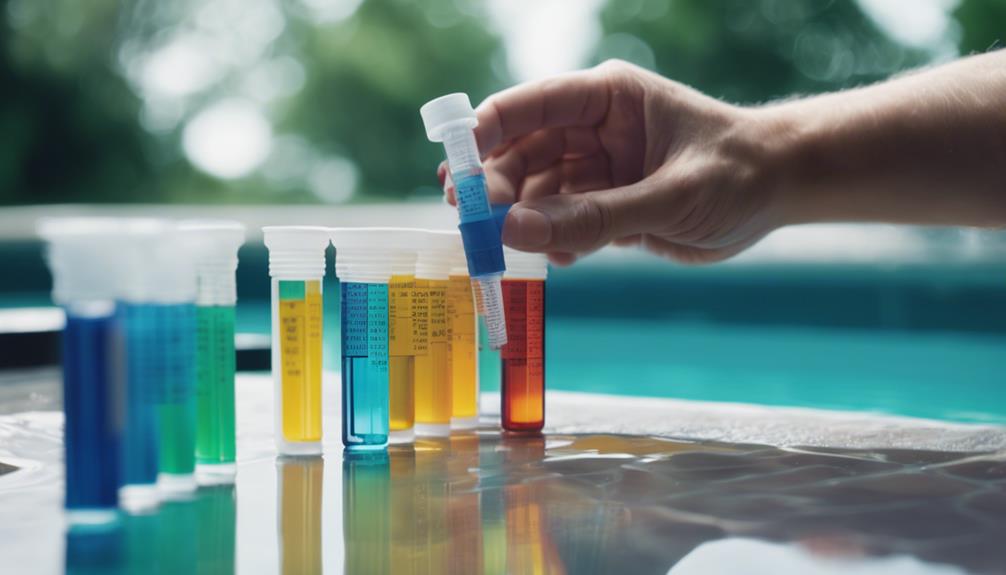
To guarantee your pool stays clean and safe, it's important to regularly test the water and maintain proper chemical balance.
Testing your pool water weekly is vital to make sure the right water chemistry. Keep pH levels between 7.2 and 7.6 for effective sanitizer performance. Check Total Alkalinity to stabilize the water and prevent pH swings. Monitoring calcium hardness helps prevent scaling and corrosion.
Additionally, remember to shock your pool regularly to eliminate contaminants and maintain water clarity. Maintaining the chemical balance in your pool is essential for a safe and enjoyable swimming experience.
By staying on top of water testing and adjustments, you can ensure that your pool remains a revitalizing oasis for you and your family.
Frequently Asked Questions
How Do I Make My Pool Water Crystal Clear?
To make your pool water crystal clear, test and balance the chemistry regularly, vacuum, brush, and skim debris, shock weekly, maintain the filter, and consider a robotic cleaner. Following these steps guarantees sparkling clear water for your enjoyment.
How to Keep Your Intex Pool Crystal Clear?
To keep your Intex pool crystal clear, regularly test water chemistry, vacuum debris, use a filter pump, apply pool chemicals, and cover when not in use. Imagine this: 95% of pool cloudiness can be prevented with proper maintenance.
Will Baking Soda Clear a Cloudy Pool?
Yes, baking soda can clear a cloudy pool. It helps balance pH levels, enhancing water clarity. Use it sparingly to avoid pH overcorrection. Baking soda is cost-effective and safe. Remember to monitor pH levels regularly when using baking soda for best results.
How to Get Crystal Blue Pool Water?
To achieve crystal blue pool water, maintain water chemistry, clean regularly, vacuum pool surfaces, shock weekly, and use a robotic cleaner. These steps guarantee a sparkling pool that's inviting and clear. Enjoy the shimmering oasis!
Can the Cleaning Steps for a Pool also be Applied to Keeping an RV Interior Clean?
Yes, the cleaning steps for a pool can be applied to keeping an RV interior clean. Regular vacuuming, wiping down surfaces, and using cleaning products made specifically for RVs are handy RV interior cleaning tips. Just as with a pool, regular maintenance is key to keeping the interior of your RV clean and inviting.
Conclusion
To sum up, maintaining your pool clean is crucial for enjoying crystal clear water all summer long. Did you know that a pool pump should run for about 8-12 hours a day to keep the water properly filtered and sanitized?
By following these simple steps regularly, you can guarantee your pool stays sparkling clean and ready for endless fun in the sun.
So grab your supplies and get cleaning!
